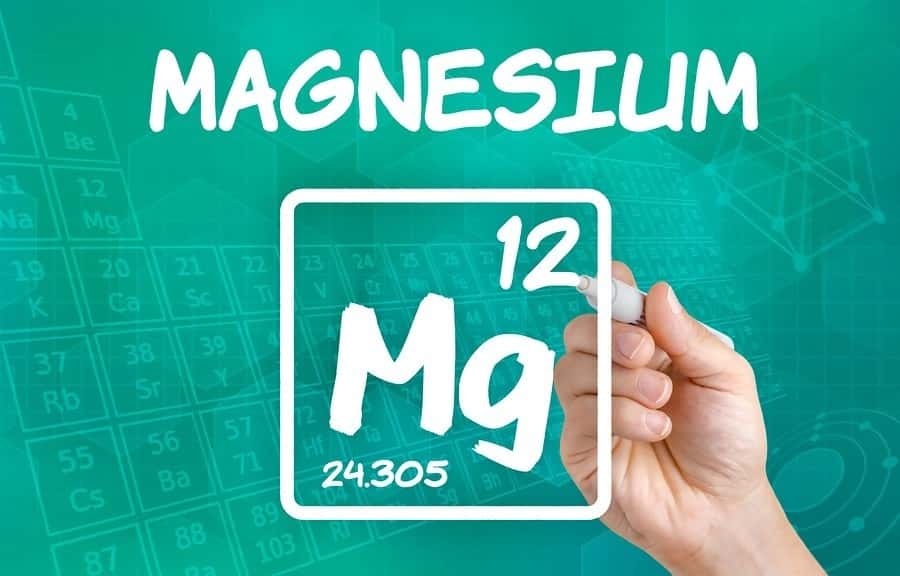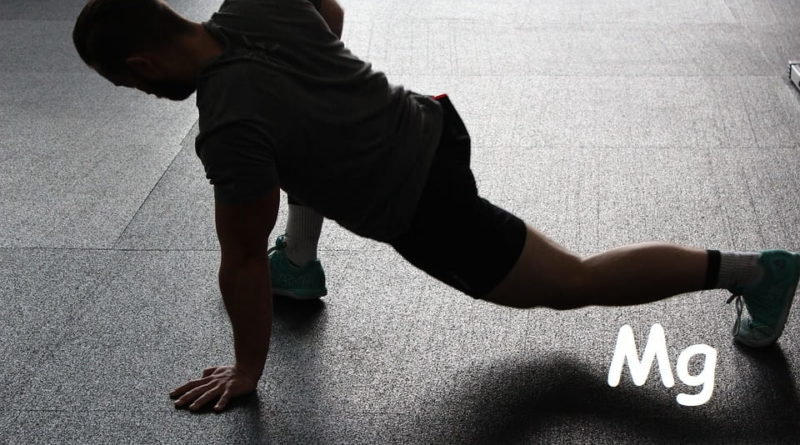Best Magnesium For Athletes
Magnesium is an important mineral found in our body and it is naturally present in many foods.
It can be added to food products and is available as dietary supplements.
Magnesium is known to play a crucial role in our bodies. It is an element which supports our muscle and nerve function as well as production of energy.
Magnesium is an important element for athletes in particular because it contributes to structural development of bone and antioxidants like glutathione.
But with many varieties out there, which is the best magnesium for athletes? We will take a closer look in this article.
Author: Dr Sharmila Samaranayake (MBBS, DCH) & Josh Matthews (BSc MS)
Why Is Magnesium An Important Element For Athletes?
Magnesium is a cofactor in many enzymes, while regulating many diverse biochemical reactions in our body.
It is important for protein synthesis, blood sugar control and blood pressure regulation.
It is also important for glycolysis as it helps to convert glucose into high energy molecules.
Magnesium is also important to conduct nerve impulses. It acts as an electrical conductor which helps to contract our muscles.

It makes our heart beat steadily and helps to maintain a normal heart rhythm. These benefits of magnesium are essential for good athletic performance.
Research has shown that supplementing magnesium can boost exercise performance in athletes [1].
Magnesium reduces accumulation of lactic acid and reduces the perception of fatigue during strenuous exercises. This is through its action on the nervous system.
There is evidence that requirement of magnesium is significantly elevated in athletes and a higher intake of magnesium will assist performance.
Many studies have evaluated the association between magnesium status, magnesium supplementation and exercise performance.
These studies found that the requirement for magnesium increases as the physical activity level of the individual is higher.

Animal studies showed that exercise performance was increased by enhancing the availability of glucose in the brain, blood and muscle by magnesium supplementation.
The glucose availability supports the energy production. Also the lactate accumulation was either reduced or delayed which boosts exercise performance as the pain and cramps are reduced.
There is also a positive association between the status of magnesium and the muscle performance.
This includes the lower leg power, grip strength, knee and ankle extension strength, also rotation and jumping performance. Quadriceps torque is also shown to increase.
Magnesium can also improve the speed of gait and chair stand time according to research done in elderly women.
Magnesium Deficiency In Athletes
Individuals may become magnesium deficient due to health conditions that lead to excessive loss of magnesium.
For example those suffering from gastro-intestinal diseases like Crohn’s Disease and Celiac Disease.
Early symptoms include loss of appetite, nausea, vomiting, body weakness and fatigue.

With worsening magnesium deficiency, you can get tingling and numbness, muscle contraction and cramps.
Severe deficiency can lead to seizures, changes in personality and abnormal heart rhythm.
These symptoms may become more noticeable during exercise due to the bodies reliance on the muscular skeletal and cardiovascular systems.
Daily Requirement of Magnesium
Magnesium is an important nutrient, and by just a few servings of magnesium rich foods a day, you can surely meet your daily requirement.
The Recommended Dietary Allowance or the RDA for adults between 19 to 51 years is 400-420 mg daily for men and 310-320 mg for women.
Pregnant females require about 350-360 mg daily. During lactation this requirement is same as for non-pregnant females that is 310-320 mg.
The tolerable upper intake level (UL) is the maximum daily intake that is unlikely to cause harmful effects to our health.

Extra magnesium from food is safe because our kidneys eliminate the excess amounts in urine. However, UL for magnesium is 350mg from supplements.
High dose of magnesium from supplements can cause side effects like nausea, diarrhoea and abdominal cramps.
It is found that more than 50% of magnesium in the body is stored in our bones, and the remaining is found in various other tissues throughout our body.
Low magnesium levels in the blood do not cause symptoms usually.
However, if your magnesium levels are chronically low, it can increase the risk of heart disease, increased blood pressure, diabetes mellitus (Type 2) and osteoporosis.
Do Athletes Require More Magnesium (RDA For Athletes)?
Due to strenuous exercise increasing urinary and sweat loss, magnesium requirements may increase by 10-20% [2].
Those who cut calories for weight loss purposes will likely fail to consume the required daily mineral requirements. Therefore are more at risk of being magnesium deficient.
Research suggests that athletes with low magnesium are not only at an increased risk of muscle damage while exercising, they may also have a reduced ability to recover [3].
Research also suggests that magnesium may help prevent tissue damage in athletes [4].

What Are Good Magnesium Food Sources For Athletes?
Before you reach for supplements, it is important to know the sources of magnesium which are freely available.
There are many magnesium rich foods which are easily obtainable. These include:
- Seeds and Nuts (like pumpkin seeds, almonds, chia seeds)
- Whole Grains
- Soy
- Green Leafy Vegetables (like spinach)
- Beans and Other Legumes
- Milk and Yogurt
- Fortified Foods Such As Cereals, Oat Meal
- Nuts (such as almonds and cashews, also peanut butter)
- Salmon, Beef, Poultry
Water is a good source of magnesium and it is present in mineral and bottled water and even tap water.
Dietary surveys done in US show that many adults consume less than recommended amounts of magnesium, although it is present in many freely available foods.
Unfortunately many people do not get sufficient magnesium from their diets. Therefore, it has become a trend to reach for supplements.

Magnesium (Mg) Supplements For Athletes
Magnesium supplements are available as a variety of types.
They include Magnesium Citrate, Magnesium Glycinate, Magnesium Acetate, Magnesium Malate, Magnesium Sulfate, Magnesium Taurate, Magnesium Oxide and Magnesium Chloride.
The dietary supplement label gives you the amount of elemental magnesium in each product.
Remember, this is not the weight of the magnesium containing compound.
Absorption of Magnesium from different types of supplements vary.
Types of magnesium which dissolve well in liquid are more easily absorbed in the gut. e.g. Magnesium Citrate, Magnesium Chloride, Magnesium Lactate and Magnesium Aspartate are absorbed more completely.
What Types of Magnesium Are Used By Athletes?
Different types of magnesium supplements target different health benefits. The absorption and bioavailability also varies according to the product.
Magnesium Glycinate / Biglycinate
This magnesium is combined with glycine which is an amino acid.
Glycinate form will absorb better and usually will not cause digestive distress. Magnesium Glycinate comes as capsules and in powder form, with powder form being better for absorption.
Magnesium Glycinate is beneficial for your neurological as well as psychological health (has a calming affect which may help anxiety and other mental health disorders).
Glycine also increases blood flow to the extremities, which may help you cool down following exercise.
This is also a highly absorbable form of magnesium, and the bioavailability is high in this supplement.
The supplement Pregnamag contains Magnesium Glycinate as its main ingredient, and you can find further details here.
Magnesium Citrate
Magnesium Citrate has been found to give a higher serum concentration of magnesium when compared with other magnesium supplements. This means is has a high bioavailability.
Daily supplementation with magnesium citrate shows a superior bioavailability after 60 days of treatment when compared with other supplements [5].
Magnesium citrate helps women athletes additionally, as it reduces symptoms of pre-menstrual syndrome.
The citric acid component in Magnesium Citrate acts as a mild laxative. If you suffer from constipation, Magnesium Citrate is the best option.
As it comes in powder form, the extra water helps to promote regular bowel movements.
There is an argument however to say that these increased bowel movements will cause an increased chance of the body losing vital minerals.

Magnesium Taurate
Magnesium Taurate is suitable for those with cardiovascular disease due to its cardioprotective properties.
In animal studies [6] it has been shown to help reduce hypertension (high blood pressure) and cardiotoxicity, making it a great supplement to improve the cardiovascular health.
Bound to the amino acid taurine, this magnesium may help remove waste from muscles more quickly, therefore aiding recovery and energy production.

Magnesium Carbonate
This magnesium turns in to Magnesium Chloride in the stomach.
It comes in powder form and offers soothing antacid benefits.
So not overly relevant to athletic applications, and is more used in the food industry.
Funily enough though, the powder used by weightlifters, billiards players, rock climbers is often Magnesium Carbonate.
Magnesium Chloride
Magnesium Chloride has a good absorption rate. It is also a good form to detoxify your cells and tissues.
However, when these supplements have an enteric coating, it can impair the bioavailability of magnesium [7].
Magnesium Chloride however is more often seen in the form of Magnesium Flakes, or a spray.
This is useful in replenishing the body of this essential mineral, and aiding recovery following exercise.

Magnesium Malate
The malic acid which is present in magnesium malate plays an important role in energy production and ATP synthesis (Adenosine Triphosphate, the primary source of energy in the body).
As a result it can help fatigue in athletes, and corrects over tiredness.
May also aid muscle recovery [8]
Magnesium Oxide
According to a study, the bioavailability of Magnesium Oxide is relatively poor (fractional absorption of 4%) when compared with Magnesium Chloride, Magnesium Lactate and Magnesium Aspartate, which are much greater equivalent to each other.
Magnesium oxide is the most affordable form, and it is also found commonly as over the counter products and in groceries. It comes in tablet form.
Not ideal for athletes, and is more commonly used for indigestion and constipation.
It is mixed with water to create magnesium hydroxide, and helps with the above conditions.
Magnesium Acetate
This magnesium is a soluble product and has a high bioavailability, almost as high as almonds which is a magnesium rich food source.
This type of magnesium is typically only used as a food additive, or in chemistry.
What Is The Best Magnesium For Athletes?
As you can see, some types of Magnesium are better than others when used for athletics or exercise.
The best type of magnesium for athletes would appear to be one of the following types:
- Magnesium Glycinate/Biglycinate
- Magnesium Taurate
- Magnesium Malate
Magnesium Glycinate – This is a highly absorbable form of magnesium which is gentle on the digestive system.
Highly bioavailable to the body, and benefits your physical, neurological, and psychological health.
Check out Pregnamag here, which is a magnesium supplement which contains Magnesium Glycinate as its active ingredient.
Magnesium Taurate – A good choice for those concerned with protecting their heart, and controlling blood pressure.
It also promotes healthy blood sugar, and aids muscle recovery and energy production.
Magnesium Malate – This is a great choice for people suffering from fatigue.
Malic acid has also been studied for it’s ability to promote muscle recovery.
Magnesium Absorption
It is important to keep in mind that magnesium is best absorbed on an empty stomach.
Vitamin C and Calcium increase the absorption of magnesium.
However, high fibre diets and carbonated drinks are known to inhibit the absorption of magnesium.
Magnesium is best absorbed when taken as small frequent doses. Therefore, it will be beneficial if magnesium is taken as 100 – 200mg doses 2-3 times a day.
If you obtain too much of magnesium from the foods you consume, it is not a concern.
However, if you get high doses of magnesium from the supplements and medications, it can give rise to many unwanted side effects like nausea, diarrhoea and abdominal cramps.

When Is The Best Time For Athletes To Take Magnesium?
I find the following routine has worked best for me.
You can take half of the daily dose soon after exercise and the rest at bed time.
This will begin facilitating recovery immediately after exercise, and will also improve your sleep.
Magnesium Interactions
Magnesium supplements are known to interact with some antibiotics and other medications such as magnesium containing antacids and laxatives.
Therefore, it is important to inform your doctor or the pharmacist before you consider buying a magnesium supplement.
Summary
Magnesium is a key factor in making several parts of our body to function smoothly: our heart, muscles, bones and nerves.
Without sufficient magnesium, these organs may malfunction.
Research has found that a low magnesium diet can lead to many health problems.
Therefore, if you are unable to obtain necessary requirement of magnesium from your diet, or if your body has problems of absorbing nutrients, it is beneficial to go for a supplement.
Because magnesium is such an important element, athletes will have many benefits from magnesium supplementation, especially if they are unable to obtain enough magnesium from their diet.
Make sure you discuss with your doctor regarding how to choose the best magnesium supplement.
We hope this article helped you find the best magnesium for athletes, please check out curemycramp.com for more articles like this.
Disclaimer: All information on this site is for information only, and not intended to replace the advice of a qualified medical professional. curemycramp.com and any writers associated with this website accept no responsibility for circumstances arising from the use of information on this site, without consulting a registered health professional first.
References
1/ Can Magnesium Enhance Exercise Performance? – https://www.ncbi.nlm.nih.gov/pmc/articles/PMC5622706/
2/ Update on the Relationship Between Magnesium and Exercise – https://pubmed.ncbi.nlm.nih.gov/17172008/
3/ Impact of Magnesium Supplementation in Muscle Damage of Professional Cyclists Competing in a Stage Race – https://www.ncbi.nlm.nih.gov/pmc/articles/PMC6723322/
4/ Effect of magnesium supplementation on muscular damage markers in basketball players during a full season – https://www.researchgate.net/publication/319175277
5/ Mg Citrate Found More Bioavailable Than Other Mg Preparations in a Randomised, Double-Blind Study – https://pubmed.ncbi.nlm.nih.gov/14596323/
6/ Magnesium Taurate Attenuates Progression of Hypertension and Cardiotoxicity Against Cadmium Chloride-Induced Hypertensive Albino Rats – https://www.ncbi.nlm.nih.gov/pmc/articles/PMC6435948/
7/ Intestinal Absorption of Magnesium From Food and Supplements – https://pubmed.ncbi.nlm.nih.gov/1864954/
8/ Effect of Malate-oligosaccharide Solution on Antioxidant Capacity of Endurance Athletes – https://www.ncbi.nlm.nih.gov/pmc/articles/PMC4787273/

